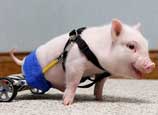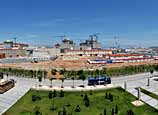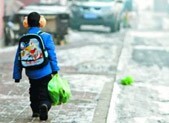
In the county-level city of Jinzhou, a kind of salad mixed with corn batter and wild herbs is called "kulei," which translates as "bitterness and hardship."
The dish, created decades ago when farmers had little food to fill their stomaches, can also be found on dining tables there, although hunger is no longer a problem.
"We still have it now to remind ourselves of the past and cherish the present," said Chu Xingyu, chief of the Jinzhou City Committee of the Communist Party of China (CPC).
Located in north China's Hebei province, Jinzhou is just a three-hour drive from Beijing. However, the annual per capita income for residents of the city is just 10,000 yuan (1,604 U.S. dollars), or one-third of the average annual income of Beijing residents.
In November 2012, the CPC announced that it would attempt to double China's GDP, as well as residents' per capita income, by 2020 in comparison to 2010 levels.
"The key to realizing this goal lies at the most basic levels," Chu said.
In Jinzhou's village of Jiangjiazhuang, Jiang Yongqiang has turned his pear farm into a grape farm, which allowed him to nearly double his income.
"Grapes are more nutritious, as well as more profitable," Jiang said.
Although grape farming is currently prosperous, Lan Zhanbiao, the township's CPC head, is still concerned about the villagers' future.
"What if there are market fluctuations or a supply surplus?" said Lan. "Farmers with meager incomes cannot bear huge losses."
To help avoid risks, the township government is trying to help farmers build their own brands, cultivate improved varieties of fruit and introduce fruit processing.
The biggest problem is a shortage of funds. The local government's fiscal revenues are just enough to cover its own expenses.
To encourage farming and ensure food security, the central government in 2004 started offering farming subsidies. To avoid embezzlement by local governments, the subsidies were given directly to the farmers.
Lan said the central government has earmarked significant amounts of money for the subsidies, while the township government had no budgetary authority.
"The subsidies, 106.1 yuan per person in our case, are not much individually but will play a huge role if they are added up together for better allocation," Lan said.
"Without enough funds, all our plans to help the farmers will be in vain," said Lan, adding that more funds should be allocated for low-level governments, with more transparent supervision to prevent embezzlement.
China has a rural population of 650 million. According to figures released by the National Bureau of Statistics in January, the Gini coefficient, an index that measures the wealth gap of a given region, has exceeded the warning level of 0.4 set by the United Nations for the last 10 years in a row.
The index hit 0.47 in China last year. Protests related to land disputes, unpaid wages and corrupt local officials have been seen among Chinese farmers for years.
For thousands of years, agriculture has supported the country's development. But the wages paid to farmers who go to work in factories now outpaces the money that can be made by farming.
To mitigate the impact of the global economic downturn on local textile companies, the Jinzhou government has arranged for entrepreneurs to visit technologically advanced factories in east China's Jiangsu province so they can learn how to improve the quality of their products and boost their market shares.
Chinese leader Xi Jinping said in late December that the most arduous task facing China in completing the building of a moderately prosperous society is in boosting the development of rural areas.
"A well-off China won't come if people in rural areas can't live a well-off life," Xi said while visiting an impoverished county set deep in the Taihang Mountains of north China's Hebei province.
According to a report delivered at the opening of the 18th CPC National Congress held last November, a moderately prosperous society must feature sustained and sound economic development, expanded democracy, improved soft power, increased living standards and environmental awareness.
Successfully building such a society by 2020 is expected to be widely discussed during the national legislative and political consultative sessions in March.
According to the 2011 Human Development Report released by the United Nations Development Programme, China ranked 101st on the report's human development index, far behind its second-place economic index ranking. The criteria used to create the index include a country's health, education and living standards.
"A moderately prosperous society means more than GDP and income figures. From this standpoint, we have a long way to go," said Chu.
















 A 9-year-old son takes good care of his amputee mother: "adults have a priority over delicious meals"
A 9-year-old son takes good care of his amputee mother: "adults have a priority over delicious meals"


![]()
